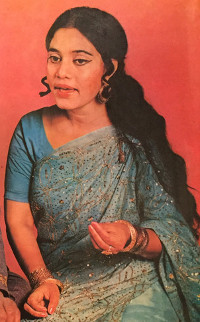Nighat Seema
Nighat Seema | |
|---|---|
| نگہت سیما | |
 | |
| Born | 18 July 1946 |
| Died | 4 April 2006 (aged 59) |
| Nationality | Pakistani |
| Occupations |
|
| Years active | 1964 - 2006 |
| Spouse | Taj Multani (husband) |
| Children | Ahsan Ali Taj (son) Sana Ali (daughter) |
Nighat Seema was a Pakistani radio and film singer during the era of 60s and 70s. She is known for singing semi-classical songs, ghazals, and playback singing.[1][2] She was the mother of music composer Ahsan Ali Taj.
Early life and family
[edit]Seema was born in Ajmer. She belonged to a Bengali family that had settled in Karachi.[3][4]
Singing career
[edit]Seema was a radio singer who used to sing at different radio stations of East and West Pakistan.[3][5][6] She got her musical training from the classical singer Tufail Niazi.[7] Her career as a playback singer started with film Chhoti Behan that was released in 1964.[3][8] She sang solo songs and also duets with Irene Perveen, Ahmed Rushdi,and Masood Rana for 37 Urdu and Punjabi movies.[9]
Seema recorded many semi-classical songs, ghazals, patriotic songs, and Kalam-e-Iqbal for Radio Pakistan and Pakistan Television.[10][11] Besides Urdu and Punjabi songs, she also vocalized songs in Bengali, Sindhi and Pashto languages.[3][12]
Personal life
[edit]Seema was married to the folk singer Taj Multani who died in 2018.[3] They both had a daughter named Sana Ali and a son named Ahsan Ali Taj who also adopted the singing career.[13]
Death
[edit]Seema died on 4 April 2006 in Karachi.[14] She was laid to rest in Wadi e Hussain Cemetery in Karachi.[14]
Popular songs
[edit]Film
[edit]- 1964 (Film: Chhoti Behan - Urdu) ... Ashkon Kay Diye, Sadqay Tujh Peh A Chand, Music: Lal Mohammad Iqbal, Poet: Sehba Akhtar,
- 1964 (Film: Chhoti Behan - Urdu) ... Geet Gati Hayn Khawabon Ki Parchhaian, Pyar Lenay Lag Phir Say, Singer(s): Nighat Seema, Masood Rana, Music: Lal Mohammad Iqbal, Poet: Masroor Anwar
- 1964 (Film: Chhoti Behan - Urdu) ... Kali Hasraton Ki Na Khil Saki, Tera Pyar Ras Na Aa Saka, Singer(s): Nighat Seema, Masood Rana, Music: Lal Mohammad Iqbal, Poet: Masroor Anwar
- 1968 (Film: Mahal - Urdu) ... Awaz Jab Bhi Den Ham, Pehchan Jayie Ga, Singer(s): Mehdi Hassan, Nighat Seema, Music: Rasheed Attray, Poet: Fyaz Hashmi
- 1970 (Film: Jalay Na Kyun Parvana - Urdu) ... Jab Bhi Tumharay Husn Kay Jalway Bikhar Geye, Singer(s): Ahmad Rushdi, Nighat Seema, Music: Nashad, Poet: Taslim Fazli
- 1971 (Film: Afshan - Urdu) ... Mili Hay Aaj Zamanay Ki Har Khushi Mujh Ko, Singer(s): Ahmad Rushdi, Nighat Seema, Music: Nashad, Poet: Taslim Fazli
Radio
[edit]- Wo Keh Gaye Thay Keh Aaen Gey Hum, Poet: Innam Bakhsh Nasikh
- Baat Karni Mujhe Mushkil Kabhi Aisi To Na Thi, Poet: Bahadur Shah Zafar
- Wo Harfe Raaz Keh Sikha Gaya Hai Mujh Ko Junoon, Poet: Allama Muhammad Iqbal
- Tu Abhi Reh Guzar Mein Hai Qaid e Maqam Se Guzar, Poet: Allama Muhammad Iqbal
Television
[edit]- Ye Kavita Pakistani Hai
References
[edit]- ^ Illustrated Weekly of Pakistan, Volume 19, Issues 36-52. Pakistan Herald Publications. p. 36.
- ^ Accessions List, South Asia, Volume 2. New Delhi, India : Library of Congress Office. p. 979.
- ^ a b c d e "ریڈیو اور فلمی دنیا کی معروف گلوکارہ نگہت سیما کی برسی". ARY News. Retrieved 28 November 2021.
- ^ Who's Who: Music in Pakistan. Xlibris Corporation. p. 196.
- ^ Illustrated Weekly of Pakistan. Pakistan Herald Publications. p. 36.
- ^ Illustrated Weekly of Pakistan, Volume 15. Pakistan Herald Publications. p. 10.
- ^ The Pakistan Review. Lahore, Ferozsons. p. 45.
- ^ Orient, Volume 1. Karachi Magazine. p. 7.
- ^ Teenager, Volume 4. M.M. Ahmed. p. 24.
- ^ Illustrated Weekly of Pakistan, Volume 15, Issues 23-33. Pakistan Herald Publications. p. 14.
- ^ Illustrated Weekly of Pakistan. Pakistan Herald Publications. p. 35.
- ^ Karachi, Megacity of Our Times. Karachi : Oxford Univ. Press. p. 402.
- ^ Humdam, Younas. "جنگ کھیڈ نیں ہوندی زنانیاں دی". Express News. Retrieved 28 November 2021.
- ^ a b "Nighat Seema, Singer". Tareekh-e-Pakistan. Archived from the original on 28 November 2021. Retrieved 28 November 2021.
External links
[edit]- Nighat Seema at IMDb
- 1946 births
- Pakistani playback singers
- Pashto-language singers
- 2006 deaths
- Bengali-language singers
- Women ghazal singers
- 20th-century Pakistani women singers
- 20th-century Pakistani singers
- Urdu-language singers
- People from Ajmer
- Pakistani people of Bengali descent
- 21st-century Pakistani women singers
- 21st-century Pakistani singers
- Radio personalities from Lahore
- Pakistani classical singers
- Pakistani ghazal singers
- Pakistani radio personalities
- Punjabi-language singers
- Sindhi-language singers
